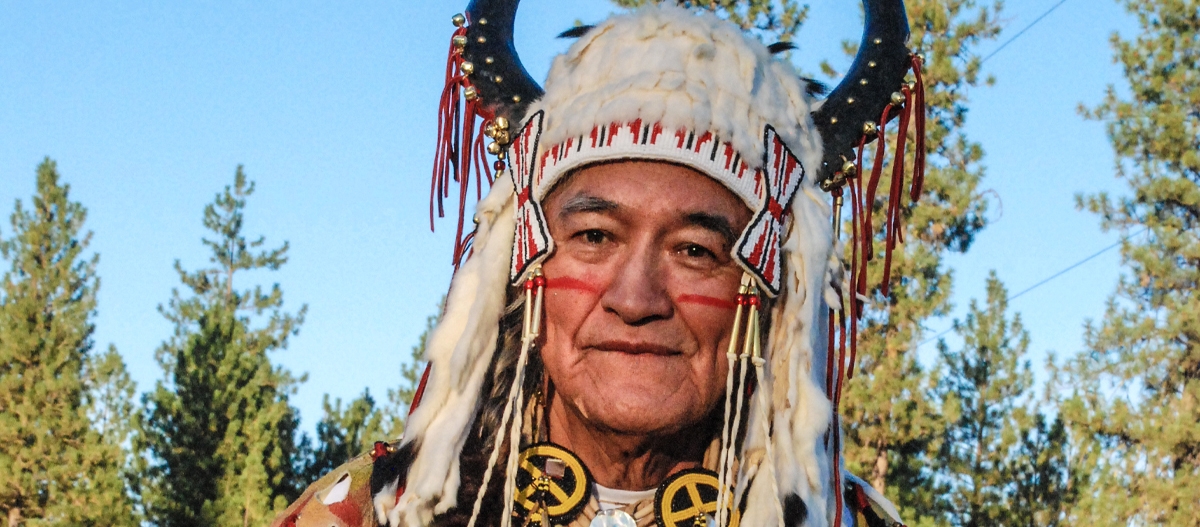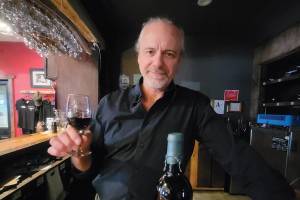By JACK McNEEL
Stephen Small Salmon, a Pend d’Oreille tribal member from the Flathead Reservation, is one of a very few tribal elders who vividly remembers the old days of his youth when everyone spoke “Indian,” and traditional culture was just part of life. Now, in his “elder” years, he works hard to keep that culture and its language alive.
Stephen’s native language is Salish—or Séliš—spoken by the indigenous peoples of the Northwest Plateau, whose original territory fell around Lake Pend d’Oreille, the Pend d’Oreille River, and Priest Lake in Idaho.
He learned his native language because that’s what he grew up with.
“I was raised by the old people, my elders,” he said. “I spent much time with them. My mom and dad were medicine people, and I grew up with them. I was just a plain old Indian.”
Stephen was born at a Catholic hospital run by nuns in the town of St. Ignatius, Mont. He turned 80 in May of this year and is, as he put it, “still dancing.”
Dancing has long been a custom of most Indian tribes. Powwows throughout the northwest are largely open for visitors to come and watch the activities, which always include lots of dancing. Many dancers travel from powwow to powwow to compete or just to renew old acquaintances.
“I’ve been dancing since I was three or four years old,” Steven said. ”My grandfather, Alexander Beaver Head, used to take me around. The only one I still remember from those years was the Arlee Powwow. It was really small then. I remember the lights from the arbor, and we had two sets of drums.”
Like many Indian youngsters, he attended boarding school, first one run by the Ursuline Catholic nuns, then to a school in Pierre S.D. He eventually went to Haskell Indian Nations University for post-graduate work, perhaps the best known of all Indian schools.
Although his education prepared him for work with the government on the reservation, he opted to work in the woods instead. Stephen eventually got into teaching, but, for a number of years, he relied on the money he won dancing at powwows.
“I was a pretty good dancer,” he said. “I’d get out there and try to win. Besides it was good exercise.”
In his younger years, he traveled widely, sometimes along the coast, sometimes to the Dakotas. He often went to reservations in between, not only in the United States, but also in Canada.
In addition to performing at powwows, Stephen has also appeared in movies. The first was about 20 years ago, titled The Big Apple.
The latest isn’t out yet but is scheduled for release soon. It’s entitled The Last Beyond.
“I did a lot of things in this movie, lots of parts,” he said. “They picked me to kind of be a star. I play a medicine man and talk Indian. They wanted me to talk Indian.”
He chuckled, “I’m kind of an important person now.” Stephen told of a trip he and his wife made to Los Angeles, to preview some Indian movies where a crowd of about 500 people had gathered.
“They were taking my picture, and I wasn’t even in these movies,” he said. “I got to meet lots of movie stars, and it was interesting for me to be in movies.”
Since then, Stephen has devoted the bulk of his time working to keep the Séliš language alive at the Nќwusm-Séliš Language Immersion School in Arlee, Mont.
“My life is good. When the language program started, I jumped in. There was an old bowling alley over in Arlee where classes were taught,” he said. For the first couple years, only three youth attended class, but Stephen said they spoke Séliš all day.
Today, 16 years later, the language program there is still going strong. “It’s still in the same place, but I love that old building,” he said. “We had 42 kids there one time. The last five or six years I’ve also worked with adults, hoping they’d become our teachers.”
Stephen argued that keeping tribal language alive is critical to maintaining the culture for all tribes. Since the arrival of white men, indiginous languages have continued to disappear. Stephen’s primary interest is to keep the Pend d’Oreille culture alive. He worries about how his native language has become more obscure.
“I sit here thinking, how am I going to get the Indian language out? How am I going to teach?” he said. “My uncle used to say, ‘you guys are going to lose everything, your language, medicine people, just everything that’s been Indian.’”
He noted how evidence of his native culture has diminished in only a matter of 30 or 40 years.
“At that time, there were so many Indians. When you went to church, they would all talk indian, all the Indians here, they only talked indian, they didn’t talk white. They knew I understood it and talked it, so they’d talk to me,” he said. “One day I woke up, and they were all gone….All gone. Language is gone, medicine is gone, just everything!”
Today he still dances and still works on his dance outfits. He regularly gets medical checkups.
“I’m up there in age, and there’s only a few of us elders left.”
Weekdays he still rises at 7:30 and drives 35 miles, one way, to Arlee in order to begin teaching by 9:00. On the way home, he stops in Mission to meet a group of adults to whom he’s recently begun teaching Séliš.
Even at 80, Stephen Small Salmon works hard, long hours to maintain the culture, the language, and the old stories of the Pend d’Oreille peoples. He frequently attends powwows in the region where he’s well-known and well-respected. MSN
For a comprehensive list of native language-learning resources for tribes across the country, visit native-languages.org.









